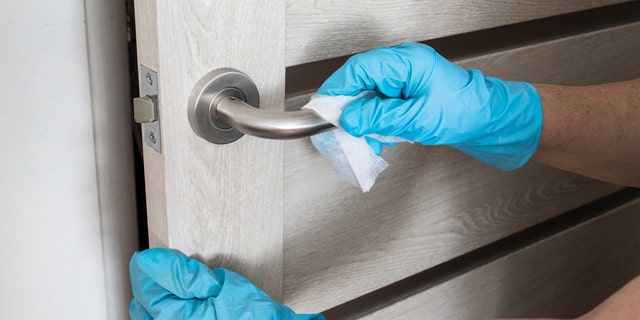Coronavirus can survive on stainless steel, glass for at least 28 days, study finds

Trump headed back to campaign trail, tests negative for coronavirus
White House physician says Trump no longer at risk of transmission; Fox News medical contributor Dr. Janette Nesheiwat on the president’s current symptoms and testing negative for the coronavirus.
The novel coronavirus may live on certain surfaces longer than previously thought, researchers say.
The main route of transmission for SARS-CoV-2, the virus causing COVID-19, is believed to be through respiratory droplets or particles in aerosols. Risk of infection by touching contaminated surfaces is possible, but is not the main way the virus spreads, according to the Centers for Disease Control and Prevention (CDC).
Researchers in Australia explored how long the virus survived under controlled temperatures and humidity settings on common surfaces. Findings were published last week in Virology Journal.
The team with Australia's national science agency, CSIRO, assessed virus survivability in various temperatures (20 °C, 30 °C, 40 °C or 68°F, 86°F and 104°F, respectively) on surfaces like glass, banknotes, cotton cloth, vinyl and brushed stainless steel. Since UV light has been shown to kill the virus, the experiment was conducted in the dark.
AMID CORONAVIRUS, 1 IN 4 AMERICANS ARE FAILING TO WASH THEIR HANDS: CDC
Researchers deposited virus samples with concentrations on par to those seen in infectious coronavirus patients onto the surfaces and measured samples for up to a month.
The virus showed to survive longer in cooler environments and on nonporous surfaces like stainless steel, glass, vinyl and banknotes for up to 28 days.
"It really reinforces the importance of washing hands and sanitizing where possible and certainly wiping down surfaces that may be in contact with the virus," the study's lead researcher, Shane Riddell, told Reuters.

Researchers emphasized the importance of disinfecting surfaces given the virus’ survivability. (iStock)
Infectious virus was not recovered after 14 days on cotton cloth (a porous surface) at the same, cool temperature. Researchers said the recovery was likely reduced because the virus adhered to the fabric fibers.
CLICK HERE FOR FULL CORONAVIRUS COVERAGE
The infectious virus also didn’t last one day in 104°F on cotton cloth, and didn't make it past 48 hours in elevated temperatures on the other surfaces.
“These findings demonstrate SARS-CoV-2 can remain infectious for significantly longer time periods than generally considered possible,” study authors wrote. Several studies published earlier in the pandemic showed that the virus could survive on stainless steel and plastic from three days, up to nine days, Fox News previously reported.
However, since the experiment was conducted under controlled conditions, the virus would likely survive for a shorter duration in more turbulent, real life settings, Riddell told the outlet.
CLICK HERE FOR THE FOX NEWS APP
Source: Read Full Article
